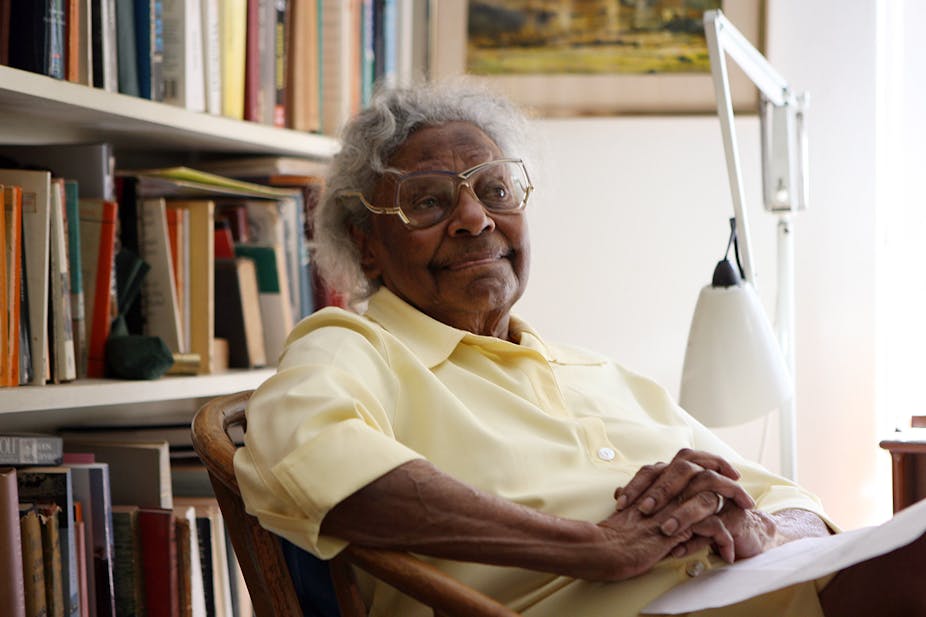Mrs Faith Bandler has died. We mourn our loss and honour her life. Her death on Friday marks the end of an era. At the age of 96 years, she outlived all the other black political activists of her generation in Australia. Her life was remarkable for a woman of colour in this country during this last century.
Born in 1918 of Wacvie Mussingken from Vanuatu and Ida Venno of South Asian and Scottish descent, her early life spanned the Great Depression and the second world war. She also lived through those great developments made in anti-racism and desegregation in the post-war period. More than this she was an outstanding activist and made a direct contribution to these monumental changes.
What made her an activist?
Many people remark on her grace and charm. We need to also recognise her intellect, her political instincts and her capacity for hard work. The young black Faith Mussingken from the Tweed River in New South Wales experienced searing racism in her life, including being paid less than white women when serving in the Women’s Land Army during the war.
Her response was to develop collaborations with people from all races and all walks of life, across class boundaries.
She made important alliances, notably with Jessie Street, the daughter of white squattocracy, and with Pearl Gibbs, an Aboriginal activist. She planned and developed strategies and campaigns to change society for the better. For the common good. Faith Bandler’s life is a monument to service to humanity.
Her intellectual capacity is also evident in that she sole authored three books: Wacvie (1977), Welou, My Brother (1984), and Turning the tide: a personal history of the Federal Council for the Advancement of Aborigines and Torres Strait Islanders (1989). With Len Fox, she co-authored another, Marani in Australia (1980), and and co-edited the collection The Time was Ripe: A History of the Aboriginal-Australian Fellowship (1983).
Importantly, she received the recognition she deserved in her lifetime, including being named a Companion of the Order of Australia in 2009. Among her many awards and accolades, my favourite was the 1997 declaration that she was an official Australian Living Treasure.

Her father Wackvie Mussingkon was approximately 13 years old when he was abducted from Ambrym Island in 1883. He was forced to work on a sugar plantation near Mackay in Queensland for 20 years until he escaped to New South Wales. Though Faith was only five years old when he died, stories of the hardship and injustice of his life formed the core of her motivation in her work for social justice.
She was greatly disappointed when reforms following the successful 1967 Referendum campaign did not include recognition and support of her own South Sea Islander people.
Bandler then took up the difficult task of defining the abrogations of rights of Australian South Sea Islanders. This was in the face of white interpretations that would see this trade in human beings as a milder form of “indentured” labour, itself a term from the slave trade of the Atlantic world. The practice of “blackbirding” is clearly one of the many complex and nuanced manifestations of the institution of slavery.
However, while Faith Bandler laid the groundwork for South Sea Islander activism, particularly in her research and written works, she did not live to see due recompense for South Sea Islander descendants in Australia and Vanuatu.
Faith Bandler gave of her youth, passion and intellect to fight racist segregation and injustice for all Australians. Her life exemplifies the contribution that South Sea Islanders have made to the development of Australian society.
How fitting it would be for the Australian people to now honour her legacy by fully acknowledging the dark chapter of kidnapping of men, women and children into forced labour. And then to duly support and compensate descendants both in Australia and in Vanuatu. This action would truly honour her and her immense contribution. The time is ripe.
May she be long remembered and her legacy live on.

